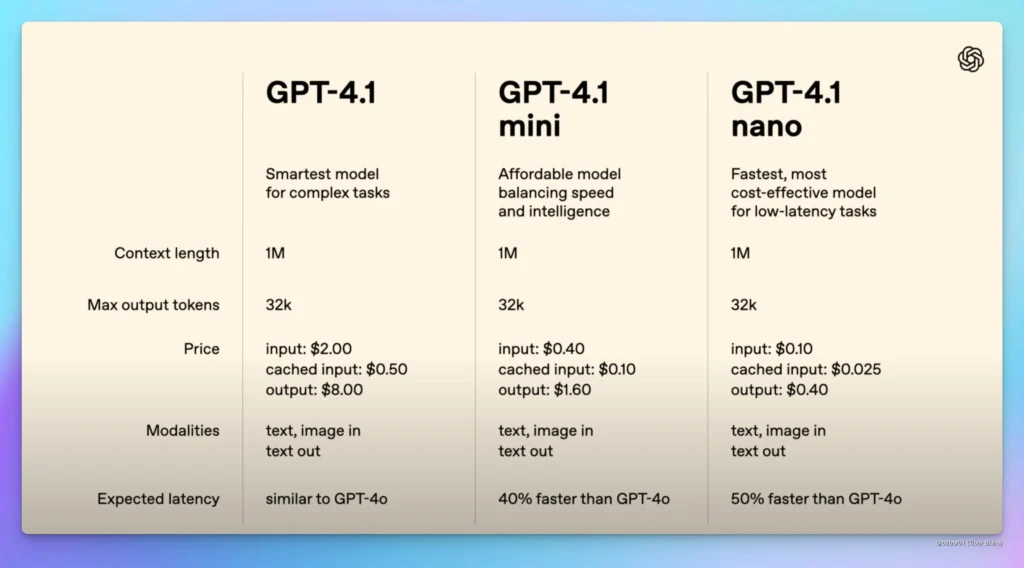On April 14, 2025, OpenAI unveiled its latest suite of AI models: GPT-4.1, GPT-4.1 Mini, and GPT-4.1 Nano. These models represent significant advancements in artificial intelligence, offering improved coding capabilities, expanded context comprehension, and enhanced instruction-following abilities. By introducing these models, OpenAI aims to provide more efficient, cost-effective, and accessible AI solutions to developers and enterprises worldwide.

GPT-4.1: Elevating AI Performance
Enhanced Coding and Instruction Following
GPT-4.1 serves as the flagship model in OpenAI’s new lineup, delivering substantial improvements over its predecessors. Notably, it exhibits a 21% enhancement in coding performance compared to GPT-4o and a 27% improvement over GPT-4.5. These advancements are particularly evident in benchmarks like SWE-Bench, where GPT-4.1 completed 55% of tasks, surpassing GPT-4o’s 33% completion rate
In addition to coding, GPT-4.1 demonstrates superior instruction-following capabilities, reducing the need for repeated prompts and enhancing user interaction efficiency. This makes it a valuable tool for developers seeking reliable AI assistance in complex tasks.
Expansive Context Window
A standout feature of GPT-4.1 is its ability to handle up to 1 million tokens in its context window. This represents a significant leap from the 128,000-token limit of GPT-4o, enabling the model to process and comprehend extensive datasets and documents more effectively. Such capacity is crucial for applications requiring deep analysis and understanding of large volumes of information.
Cost Efficiency and Accessibility
Despite its enhanced capabilities, GPT-4.1 is designed to be more cost-effective, with operational costs reduced by 26% compared to gpt-4o . This reduction makes advanced AI more accessible to a broader range of users, from individual developers to large enterprises. However, it’s important to note that GPT-4.1 is currently available exclusively through OpenAI’s API and is not integrated into ChatGPT at this time .
GPT-4.1 Mini and Nano: Compact Models with Significant Impact
GPT-4.1 Mini: Balancing Performance and Affordability
GPT-4.1 Mini offers a compelling blend of performance and cost-effectiveness. It achieves an impressive 82% on the MMLU benchmark, outperforming other small models like Gemini Flash and Claude Haiku . The model supports a context window of 128,000 tokens and is priced at $0.15 per million input tokens and $0.60 per million output tokens, making it more than 60% cheaper than GPT-3.5
GPT 4.1 Mini is multimodal, currently supporting text and image inputs, with plans to expand to audio and video inputs and outputs. This versatility makes it suitable for a wide range of applications, from content creation to customer service.
GPT-4.1 Nano: Efficiency in a Smaller Package
GPT 4.1 Nano is OpenAI’s most compact and efficient model to date. While specific performance metrics have not been disclosed, it is designed for scenarios where computational resources are limited, such as mobile devices and embedded systems. Despite its smaller size, GPT-4.1 Nano maintains a high level of performance, making it ideal for applications requiring quick, on-device processing.
Strategic Implications and Future Outlook
Phasing Out Older Models
In line with the introduction of the GPT 4.1 series, OpenAI has announced plans to phase out older models. GPT-4 will be retired from ChatGPT by April 30, 2025, and the GPT 4.5 Preview will be deprecated by July 14, 2025 . This strategic move underscores OpenAI’s commitment to advancing its AI offerings and encouraging users to adopt the latest, more efficient models.
Emphasis on Developer-Centric Tools
By releasing the GPT 4.1 series exclusively through its API, OpenAI emphasizes its focus on providing robust tools for developers. This approach facilitates the integration of advanced AI capabilities into a wide array of applications, fostering innovation and expanding the potential use cases for AI technology.
Future Developments
Looking ahead, OpenAI plans to release additional models, including full and mini versions of its new o3 and o4 reasoning models . These forthcoming models are expected to further enhance AI reasoning capabilities, providing developers with even more powerful tools for complex problem-solving tasks.
Conclusion
The launch of the gpt 4.1 series marks a significant milestone in the evolution of artificial intelligence. With enhanced performance, expanded context comprehension, and improved cost efficiency, these models are poised to revolutionize the way developers and enterprises leverage AI technology. As OpenAI continues to innovate and expand its offerings, the gpt 4.1 series sets a new standard for what is possible in the realm of AI-driven solutions.
CometAPI currently integrates the most popular GPT-4o-image API.
Please refer to GPT-4.1 Mini API, GPT-4.1 Nano API and GPT-4.1 API. for technology details.
